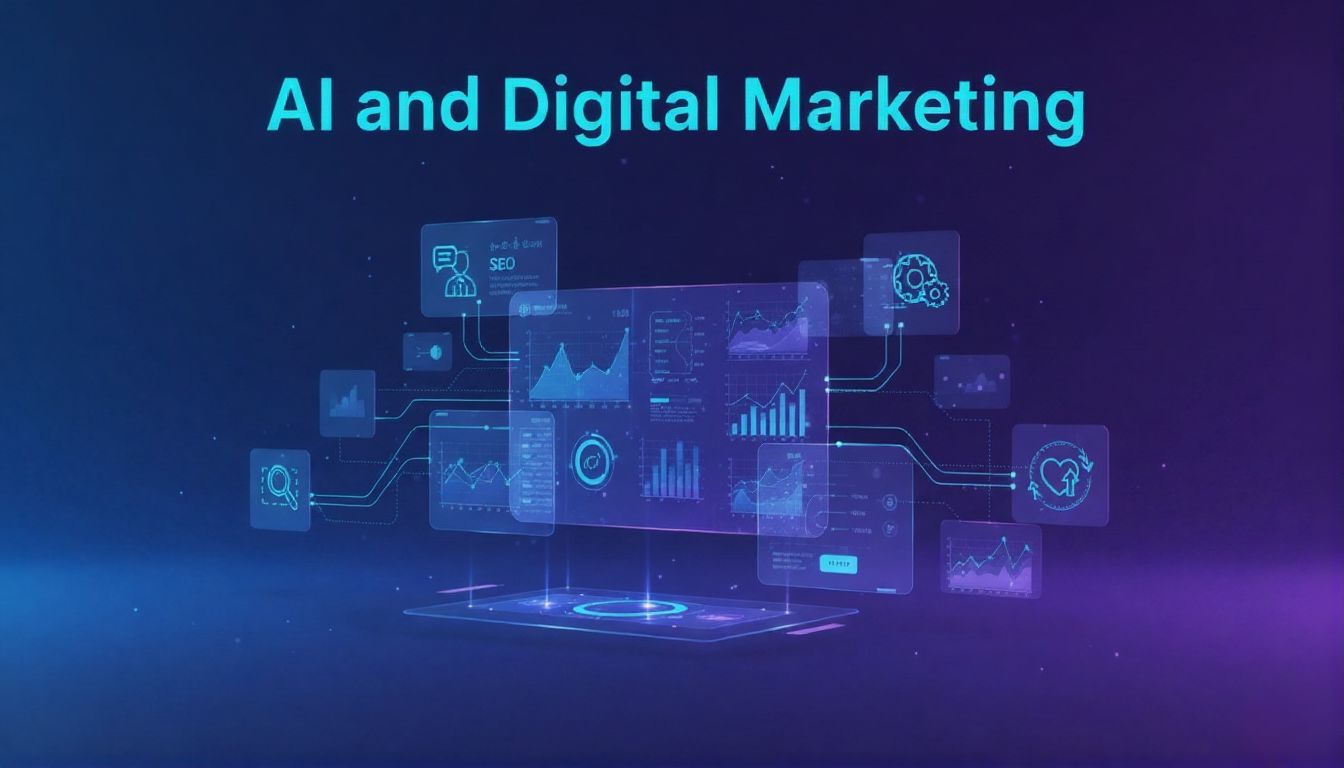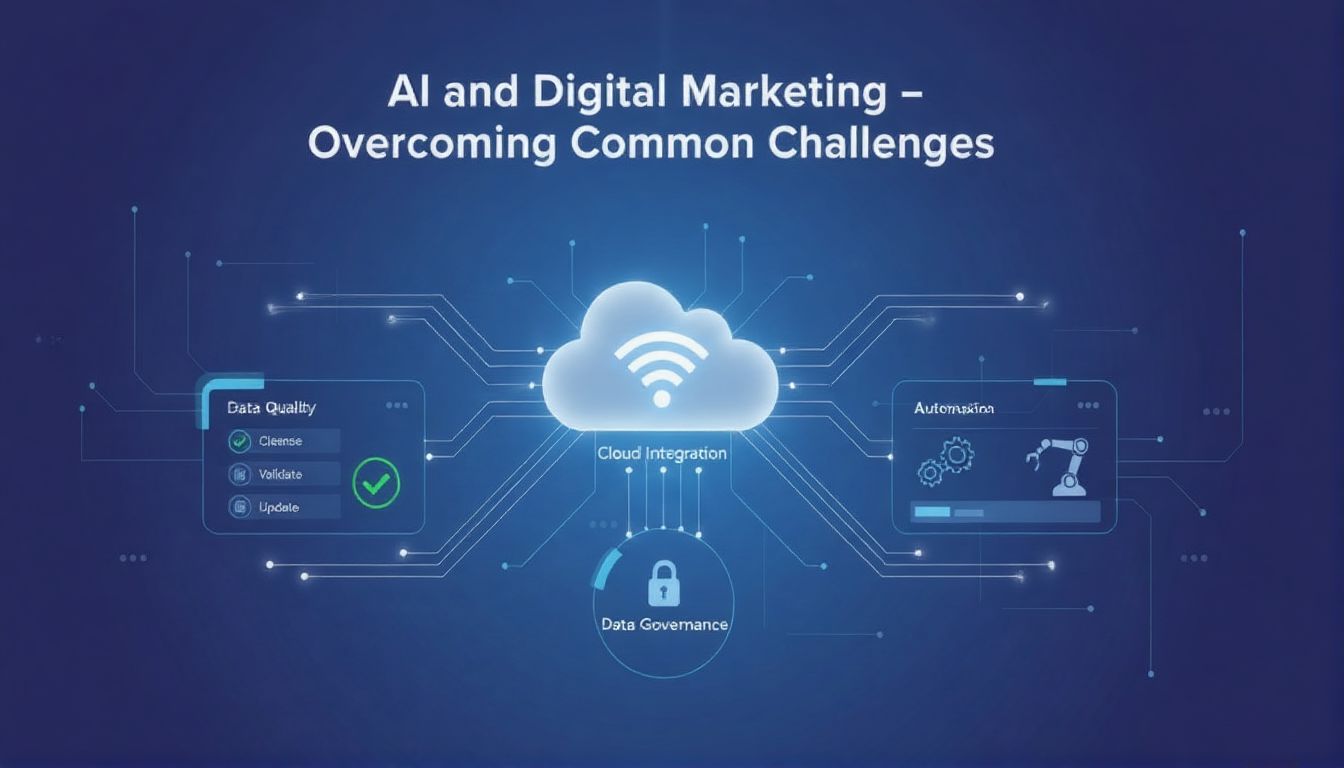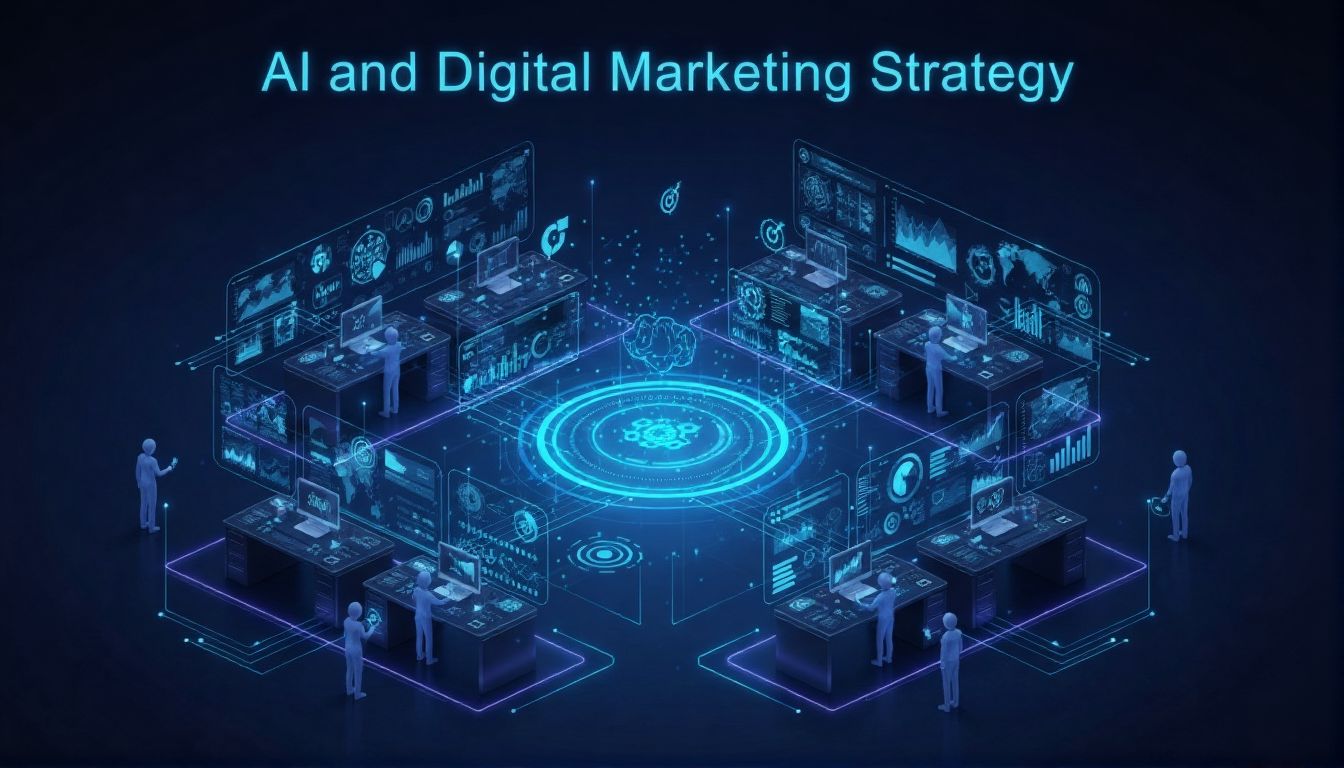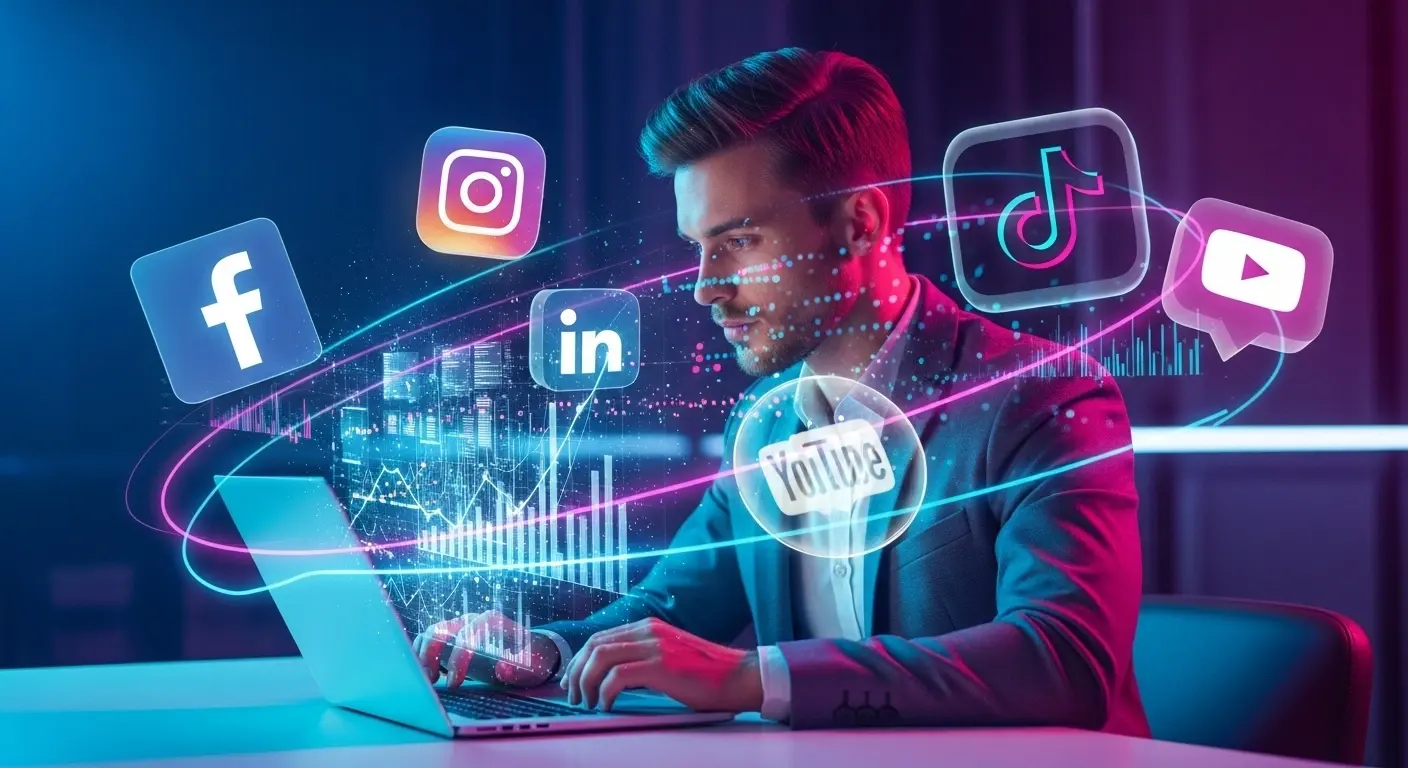Introduction
The digital marketing landscape is evolving rapidly, and AI and digital marketing have become inseparable partners in driving business success. If you’re wondering how artificial intelligence can transform your marketing efforts, you’re in the right place. AI-powered tools are now enabling marketers to automate tasks, personalize content, predict customer behavior, and maximize ROI like never before. In this comprehensive guide, you’ll discover practical strategies, real-world applications, and actionable tips to leverage AI for digital marketing effectively.
Pro Tip: Start by identifying repetitive tasks in your marketing workflow—these are perfect candidates for AI automation, saving you up to 40% of your time.
What Is AI in Digital Marketing?
Digital marketing and AI refer to the integration of artificial intelligence technologies—such as machine learning, natural language processing, and predictive analytics—into marketing strategies. AI helps businesses analyze vast amounts of data, understand customer preferences, and deliver personalized experiences at scale.
From chatbots that provide instant customer support to algorithms that optimize ad spending, AI is revolutionizing how brands connect with their audiences. According to Sprout Social’s social media marketing strategy guide, AI tools are essential for staying competitive in today’s fast-paced digital environment.
Pro Tip: Use AI-powered analytics tools to track customer journey touchpoints—this helps you understand exactly where prospects drop off and how to re-engage them.
Why AI Matters for Digital Marketing Success
Enhanced Customer Personalization
AI analyzes user behavior, browsing history, and purchase patterns to deliver hyper-personalized content. Whether it’s product recommendations on e-commerce sites or customized email campaigns, AI and digital marketing work together to ensure each customer receives relevant messages that drive conversions.

Pro Tip: Implement AI-driven email segmentation to increase open rates by up to 26% and click-through rates by 14%.
Predictive Analytics for Better Decision-Making
Predictive analytics uses historical data to forecast future trends. Marketers can anticipate customer needs, optimize inventory, and allocate budgets more efficiently. This data-driven approach minimizes guesswork and maximizes campaign effectiveness.
Automation of Repetitive Tasks
AI and digital marketing automate time-consuming tasks like social media posting, ad bidding, and content curation. This frees up marketers to focus on creative strategy and relationship building. Tools like chatbots handle customer queries 24/7, improving response times and customer satisfaction. By integrating AI and digital marketing, businesses can enhance productivity, deliver personalized experiences, and maintain
Pro Tip: Deploy AI chatbots on your website to handle FAQs—this can reduce customer service costs by up to 30% while maintaining high satisfaction rates.
Improved ROI Through Smart Ad Targeting
AI algorithms analyze millions of data points to identify high-value audiences. Platforms like Google Ads and Facebook Ads use machine learning to optimize ad delivery, ensuring your budget reaches the most relevant users. AI and digital marketing together enable this precision targeting, significantly improving return on ad spend (ROAS).
At Fast Digital 360, we specialize in implementing AI-driven marketing solutions that deliver measurable results for businesses of all sizes.
Top AI Applications in Digital Marketing
1. Content Creation and Optimization
AI-powered tools like ChatGPT and Jasper help marketers generate blog posts, social media captions, and ad copy in minutes. These tools analyze top-performing content and suggest improvements for SEO and engagement. However, human oversight remains crucial for maintaining brand voice and authenticity.
Pro Tip: Use AI to draft content outlines and initial drafts, then add your unique insights and brand personality to ensure authenticity and emotional connection.
2. Chatbots and Conversational AI
Chatbots powered by natural language processing provide instant responses to customer inquiries. They qualify leads, book appointments, and even process orders—all without human intervention. This improves user experience and conversion rates while reducing operational costs.
3. Programmatic Advertising
Programmatic advertising uses AI and digital marketing to automate ad buying in real time. The system analyzes user data and bids on ad placements that are most likely to convert. This integration of AI and digital marketing eliminates manual bidding and ensures optimal ad performance across platforms. As AI and digital marketing continue to evolve, programmatic advertising becomes even more efficient, delivering smarter targeting, higher ROI, and better audience engagement.
Select 23 more words to run Humanizer.
4. Social Media Management
AI tools schedule posts at optimal times, analyze engagement metrics, and suggest content ideas based on trending topics. Facebook marketing strategies increasingly rely on AI to identify the best times to post and the types of content that resonate with specific audience segments.
For comprehensive insights on leveraging SEO tools for business growth, explore our detailed resource guide.

Pro Tip: Use AI sentiment analysis tools to monitor brand mentions and respond to negative feedback within the first hour—this can prevent potential PR crises.
5. Email Marketing Automation
AI personalizes email subject lines, content, and send times based on individual subscriber behavior. Predictive algorithms determine the likelihood of engagement and automatically segment audiences for targeted campaigns. AI and digital marketing together make these personalized strategies more effective and data-driven.
AI vs Traditional Digital Marketing: Key Differences
| Aspect | Traditional Digital Marketing | AI-Powered Digital Marketing |
|---|---|---|
| Data Analysis | Manual analysis, limited scale | Automated analysis of millions of data points in real-time |
| Personalization | Basic segmentation (age, location) | Hyper-personalized content based on behavior and preferences |
| Campaign Optimization | Periodic manual adjustments | Continuous real-time optimization |
| Customer Support | Business hours, human agents | 24/7 automated chatbot support |
| Content Creation | Fully manual, time-intensive | AI-assisted drafting with human refinement |
| Ad Targeting | Broad demographic targeting | Precision targeting using predictive analytics |
This comparison clearly shows how AI and digital marketing integration offers superior efficiency and results compared to traditional methods.
How to Implement AI in Your Digital Marketing Strategy
Step 1: Identify Pain Points and Opportunities
Start by auditing your current marketing processes. Which tasks consume the most time? Where do you see high customer drop-off rates? These areas are prime candidates for AI and digital marketing implementation.
By identifying these weak points early, businesses can strategically apply AI solutions where they’ll have the biggest impact — such as automating repetitive tasks, improving customer segmentation, or enhancing user experience.
Gradually integrating AI and digital marketing into your strategy not only increases efficiency but also allows you to make data-driven decisions that lead to better performance and higher conversions.

Pro Tip: Create a priority matrix—rank tasks by time consumption and impact on revenue to identify which AI tools will deliver the fastest ROI.
Step 2: Choose the Right AI Tools
Select tools that align with your specific needs:
- Content creation: Jasper, Copy.ai, ChatGPT
- Analytics: Google Analytics 4, HubSpot, SEMrush
- Social media: Hootsuite, Buffer, Sprout Social
- Email marketing: Mailchimp, ActiveCampaign
- Chatbots: Drift, Intercom, ManyChat
When conducting competitor market analysis, AI tools can uncover gaps in your competitors’ strategies and identify untapped opportunities.
Step 3: Train Your Team
AI tools require proper training for maximum effectiveness. Invest in workshops, online courses, and certifications from platforms like Simplilearn’s social media marketing tutorial to ensure your team can leverage these technologies confidently.
Pro Tip: Designate an AI champion within your team who stays updated on the latest tools and best practices, then conducts monthly knowledge-sharing sessions.
Step 4: Start Small and Scale Gradually
Begin with one or two AI applications—perhaps a chatbot for customer service or an automated email sequence. AI and digital marketing tools can streamline repetitive tasks, improve customer interactions, and save valuable time for your team. Monitor performance, gather feedback, and expand to other areas once you see positive results. Over time, integrating AI and digital marketing across multiple channels—such as social media, content creation, and ad targeting—can significantly boost efficiency, engagement, and overall ROI..
Step 5: Monitor, Measure, and Optimize
Track key performance indicators (KPIs) such as conversion rates, customer acquisition costs, and engagement metrics. Use these insights to refine your AI strategies continuously.
Best Practices for AI in Digital Marketing
| Best Practice | Description | Expected Outcome |
|---|---|---|
| Maintain Human Oversight | Always review AI-generated content for accuracy and brand alignment | Ensures authenticity and prevents errors |
| Prioritize Data Privacy | Comply with GDPR, CCPA, and other data protection regulations | Builds customer trust and avoids legal issues |
| Combine AI with Human Creativity | Use AI for data analysis and automation, humans for strategy and storytelling | Creates compelling, data-driven campaigns |
| Test and Iterate Continuously | Run A/B tests on AI-driven campaigns and optimize based on results | Improves performance by 15–30% over time |
| Stay Updated on AI Trends | Follow industry leaders, attend webinars, and experiment with new tools | Keeps your strategy competitive and innovative |
Pro Tip: Set up automated alerts for when AI tools suggest significant changes—review these recommendations with your team before implementing to maintain strategic control.
Common Challenges and How to Overcome Them
Data Quality Issues
AI and digital marketing are only as good as the data they process. Ensure your data is clean, accurate, and regularly updated. Implement data governance policies and use validation tools to maintain quality. Reliable data empowers AI and digital marketing systems to deliver more precise insights, better targeting, and improved campaign performance.
Integration Complexity
Integrating AI tools with existing systems can be challenging. Work with experienced partners like Fast Digital 360 to ensure smooth implementation and minimal disruption.

Pro Tip: Start with cloud-based AI tools that offer easy API integrations—this reduces technical complexity and speeds up deployment.
Cost Considerations
While AI tools offer long-term savings, initial investments can be significant. Start with free or low-cost options, demonstrate ROI, and then justify larger investments to stakeholders.
Skill Gaps
Many marketing teams lack AI expertise. Bridge this gap through training programs, hiring specialists, or partnering with agencies that specialize in AI and digital marketing. Building in-house knowledge and collaboration around AI and digital marketing ensures smoother adoption, better results, and a competitive edge in the evolving digital landscape.
The Future of AI and Digital Marketing
The convergence of digital marketing and AI will only accelerate in coming years. Emerging trends include:
- Voice Search Optimization: AI-powered voice assistants are changing how users search for information
- Visual Search: Tools like Google Lens enable users to search using images
- Augmented Reality (AR) Experiences: AI-driven AR allows customers to virtually try products before purchasing
- Advanced Sentiment Analysis: Deeper understanding of customer emotions and intentions
- Autonomous Marketing Systems: AI that can plan, execute, and optimize entire campaigns with minimal human input
Staying ahead requires continuous learning and adaptation. Businesses that embrace AI for digital marketing now will have a significant competitive advantage in the future.
Pro Tip: Allocate 10-15% of your marketing budget to testing emerging AI technologies—early adoption often leads to higher returns and market leadership.
Conclusion
AI and digital marketing are reshaping how businesses engage with customers, optimize campaigns, and drive growth. From personalized content delivery to predictive analytics and automated customer support, AI offers unprecedented opportunities to enhance efficiency and effectiveness. By implementing the strategies outlined in this guide, you can stay competitive in an increasingly AI-driven marketplace.
Remember, successful AI integration requires a balance between automation and human creativity. Start small, measure results, and scale gradually. The future of marketing is here—are you ready to embrace it?
Ready to transform your digital marketing with AI? Contact Fast Digital 360 today and discover how our expert team can help you implement cutting-edge AI solutions tailored to your business needs!
FAQs About AI and Digital Marketing
What is AI in digital marketing?
AI in digital marketing refers to using artificial intelligence technologies like machine learning, natural language processing, and predictive analytics to automate tasks, personalize customer experiences, and optimize marketing campaigns for better results and higher ROI.
How does AI improve digital marketing ROI?
AI improves ROI by analyzing vast amounts of data to identify high-value audiences, automating repetitive tasks to reduce costs, personalizing content to increase engagement, and continuously optimizing campaigns in real-time based on performance metrics and customer behavior patterns.
Can small businesses benefit from AI in digital marketing?
Absolutely! Small businesses can leverage affordable AI tools to compete with larger competitors. AI helps automate time-consuming tasks, deliver personalized experiences, and make data-driven decisions without requiring large marketing teams or massive budgets.
What is the future of AI and digital marketing?
The future includes voice and visual search optimization, augmented reality experiences, advanced sentiment analysis, hyper-personalization at scale, and autonomous marketing systems that can plan and execute entire campaigns with minimal human interv
Want to stay ahead of the curve?
Want to stay ahead of the curve?
Explore our latest insights on digital marketing strategies and start your AI transformation journey today!




